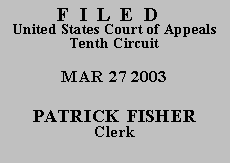

Plaintiff pro se Wayne M. Parker appeals the district court's dismissal of his claims under Bivens v. Six Unknown Named Agents of Fed. Bureau of Narcotics, 403 U.S. 388 (1971). He sought damages for injuries allegedly sustained while he was a military prisoner housed at the United States Disciplinary Barracks, Fort Leavenworth, Kansas (USDB). The district court ruled that liability was foreclosed by the Feres doctrine, which bars suits against the federal government "for injuries to servicemen where the injuries arise out of or are in the course of activity incident to service." Feres v. United States, 340 U.S. 135, 146 (1950); see Chappell v. Wallace, 462 U.S. 296, 305 (1983) (extending immunity under Feres to damages action under Bivens). We exercise jurisdiction under 28 U.S.C. § 1291 and affirm.
In 1996 Plaintiff was serving in the United States Army when he was court-martialed and subsequently convicted by a military court of rape, sodomy, assault, and adultery. He was sentenced to 10 years' confinement at the USDB, forfeiture of all pay and allowances, reduction in grade, and a dishonorable discharge.
Plaintiff alleges that while he was confined at the USDB, prison officials failed to protect him from an assault by a fellow inmate, and subsequently failed to provide him with needed medical care, in violation of his rights under the Fifth, Eighth, and Ninth Amendments. He argues that these injuries occurred after he was discharged from military service, and thus were not "incident to service" under the Feres doctrine. Accordingly, he asserts that the district court erred in dismissing his claims under Feres, and seeks a remand so that the district court may conduct a hearing to determine his military status at the time the alleged injuries occurred.
We agree with the district court that Plaintiff's lawsuit was barred by the Feres doctrine. Whether or not Plaintiff received a full discharge from military service prior to being injured is immaterial under the circumstances of this case. Even if Plaintiff had been so discharged, his injuries occurred while he was a military prisoner confined at the USDB, and thus were incident to his military service for the purposes of Feres. See Ricks v. Nickels, 295 F.3d 1124, 1130-1133 (10th Cir. 2002) (military prisoner who was discharged from service and subsequently injured while confined at USDB was barred by Feres doctrine from pursuing Bivens action), cert. denied, 123 S. Ct. 630 (2002). "[Plaintiff's] complete discharge does not place him beyond the ambit of the Feres doctrine. Because [Plaintiff] was incarcerated at a military prison. . . , the alleged constitutional violations were incident to his military service." Id. at 1133.
Accordingly, after reviewing Plaintiff's brief and the record, and for substantially the same reasons set forth in the district court's August 19, 2002, Order, we AFFIRM the decision of the district court.
ENTERED FOR THE COURT
Harris L Hartz
Circuit Judge